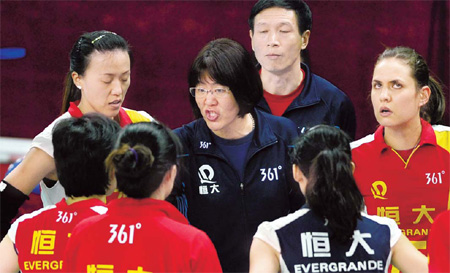|
|

Guangdong Evergrande club coach Lang Ping (center) instructs her players during their Chinese Women's Volleyball League final series match against Tianjin on Sunday. Liu Dawei / Xinhua |
With its unprecedented investment and determination to run professional teams, Guangdong Evergrande has rocked the world of Chinese sports, Tang Yue reports.
By the time national icon Lang Ping came back to China to coach the newly established Guangdong Evergrande club in 2009, she was already a world-renowned volleyball coach.
Lang had coached both the China and US national women's teams to Olympic silver medals - in 1996 and 2008 - and had been named the Women's Volleyball Coach of the Year in Italy, which is considered to have the world's best professional league.
The main reason why she turned down several offers from European clubs to return to China was that Guangdong Evergrande, unlike traditional Chinese local teams, which are mainly supported by the local government, was the first truly professional club in the domestic volleyball league.
"It is just like the clubs that I have coached overseas; it is founded by a company. This is really something new in our league and it is good for the development of the sport in China. So I just came back," said Lang, who coached in the Turkish league as well as the Italian.
With handsome investment behind her, Lang formed a star-studded lineup of players from home and abroad and the team won promotion to the top league last year after remaining undefeated in the second division.
It then went on to finish first in the recent regular season in the first tier and only narrowly lost to seven-time champion Tianjin 3-2 in the third match of the best-of-three finals series on April 3.
The rapidly improving side has not only made the fight for the title fiercer but also revitalized the 15-year-old league by bringing more fans to the stadiums and introducing world-class players, such as Logan Tom of the United States.
"I'm really glad to find the stadiums filled with fans wherever we play. In Italy, the fans treat a match like a festival. A lot of them come and they enjoy it very much," Lang said.
"However, that is not common in China. Our team's matches are OK but I know there are a lot of matches without many spectators.
"I also found our rivals were really excited to play against us since we have the world's top players like Tom. The local players may have been facing the same opponents for 10 years, as there have been few players coming from outside."
Guangdong Evergrande has signed five foreign players in the past two seasons, more than the total number signed by all the other clubs since the league was opened to foreigners in 1998.
In addition to budget concerns, local coaches are reluctant to hire foreign players because they are afraid it will give local youngsters fewer opportunities and thus finally have an impact on the four-yearly National Games, the top priority of the local sports bureau, to which the teams report.
"I know the National Games adds heavy pressure on the government-owned teams. However, the local players can benefit a lot from training and playing with high-level foreign players. They set a good example in terms of technique and professional approach," Lang said.
Lang is not only looking forward to seeing more foreign players coming to China, but would also like to see more transfers of domestic players between clubs.
According to the current policy, players over 26 years old are free agents, however free transfers have not caught on in the domestic league.
While the players are supported by their families in countries such as the US and Italy, Chinese players are funded by the local government and can't play for whichever team they want, said Lang.
"Some local coaches would rather keep their substitutes on the bench than let them play for us, even though they would receive a transfer fee," she said.
"Actually, the players can gain more experience by playing in the league and it would also be helpful for their performances in the National Games. It would be very worthwhile for them."
Despite all the difficulties, a determined Lang has confirmed she will stay with Guangdong Evergrande next season and is expecting more companies to get involved as reforms are introduced to the league.
"If you compare our league to Italy's, you will find there is a lot we need to change. We are trying hard to break free of a long-established system. My own power is limited, but I will try my best," she said.
"I really hope more enterprises will develop professional teams in China. The professional league is the basis of Chinese volleyball; it paves the way for the sport's future."
(China Daily 04/10/2011 page8) |

